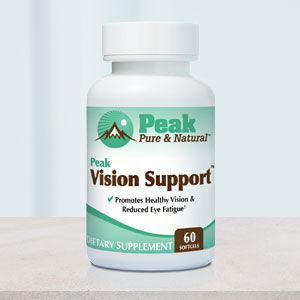Get Easy Health Digest™ in your inbox and don’t miss a thing when you subscribe today. Plus, get the free bonus report, Mother Nature’s Tips, Tricks and Remedies for Cholesterol, Blood Pressure & Blood Sugar as my way of saying welcome to the community!
The best diet to fight off macular degeneration

Imagine waking up one morning with a black spot in the center of your vision.
You might blink a few times, thinking it’s just “sleep dust.” But it doesn’t go away. Not when you wash your face. Not at all.
As the days go on, it just gets bigger.
This is what happens for a person who develops the greatest vision-stealer we know…
What is macular degeneration
Macular degeneration (MD) is an eye disease that causes more blindness than glaucoma and cataracts combined. More than ten million Americans have MD.
MD is a leading cause of vision loss among people age 50 and older, affecting 1.8 million Americans. By 2020, that number is expected to climb to nearly 3 million.
MD causes the retina of the eye to deteriorate. The retina is like your eye’s camera. It records images and sends through the optic nerve to the brain.
The macula is the central portion of the retina. Without its powers of focus, you cannot do things like reading or driving a car. The macula enables us to recognize faces and see bright colors.
People with macular degeneration may not notice it at first. But soon, a dark spot will appear in their central field of vision, and it will grow until the person is left only with peripheral vision.
As this happens, a person’s quality of life deteriorates as well. They lose their independence when they cannot drive or even take a walk on their own. The pleasure of escaping into a good book becomes impossible. And the faces of loved ones disappear from sight.
Until now, MD was considered an incurable disease.
But recent research has totally changed that and brought new hope.
The Mediterranean diet slashes MD risk
Here’s the beauty of good research: it can uncover things that were hiding in plain sight. By looking at data from a different angle, new facts emerge.
Such is the case with a study done recently by a large group of researchers from throughout the European Union who re-visited two previous large-scale studies.
The Rotterdam Study evaluated disease risk in people 55 and older, while the Alienor Study assessed the association between eye diseases and nutritional factors in people aged 73 and older.
By re-examining these studies, the European researchers discovered that people who followed a strictly Mediterranean diet were 41 percent less likely to develop macular degeneration than those who didn’t follow the diet.
What’s more, they found that eating just a few of the foods from the Mediterranean diet had no effect. It was the combination of foods and the diet as a whole that prevented MD.
Another European study confirms this exciting news.
Doctors at the University of Coimbra in Portugal analyzed diet questionnaires from 883 people age 55 or older.
Of those who adhered to a Mediterranean diet, only 39% had MD, as compared to 50% for those who did not.
Two interesting trends emerged in this study: eating five ounces of fruit a day and drinking more caffeine both made the odds against developing MD even better.
How to eat a Mediterranean diet
You’ve read quite a bit from us regarding the wonders of the Mediterranean diet. Its staple foods are fish, nuts, olive oil, fruits and vegetables, seeds and nuts, and whole grains.
And this style of eating could save more than your sight: It beats inflammation and that can help keep your brain young and save you from heart disease.
Here are a few recipes to entice you into trying this sight-saving, heart-loving diet!
Sources:
- New study confirms Mediterranean diet prevents a leading cause of blindness — American Association for the Advancement of Science (AAAS)
- Mediterranean Diet and Incidence of Advanced Age-Related Macular Degeneration — Ophthalmology
- Tracking benefits of the Mediterranean diet for AMD prevention — EyeWorld













